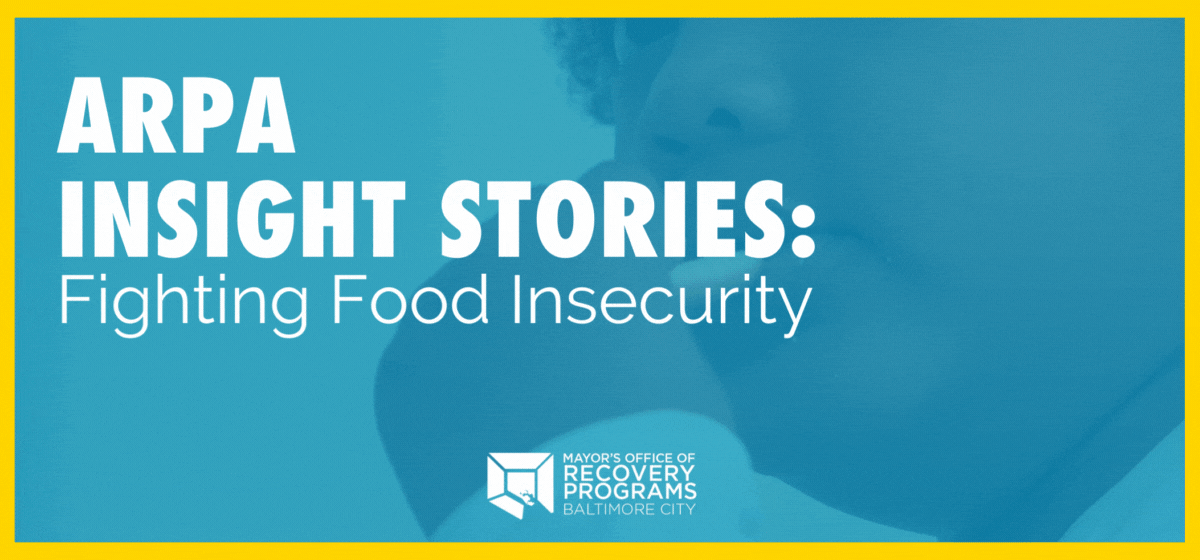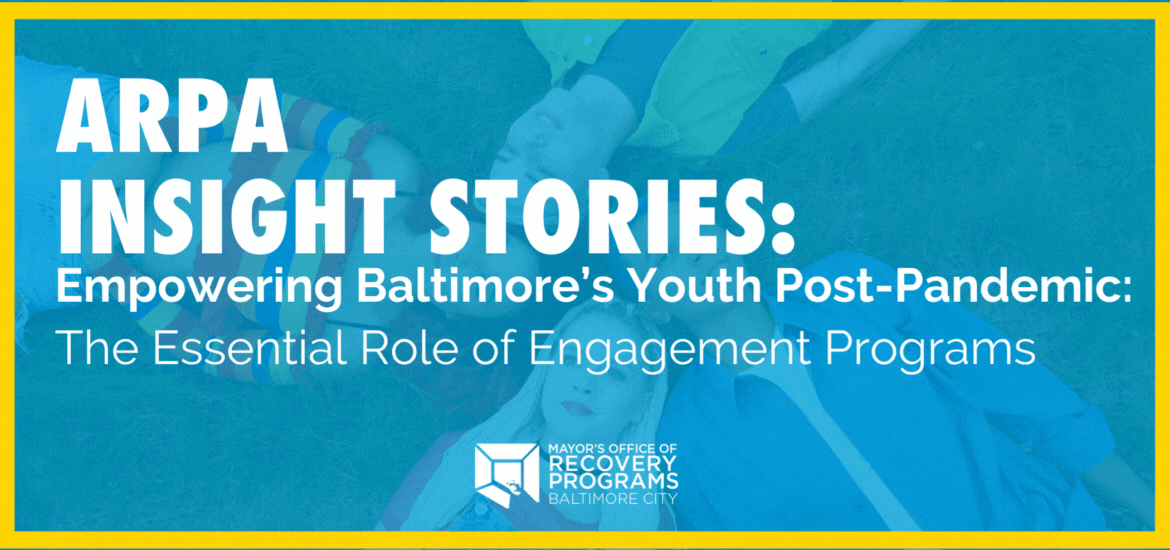ARPA Insight Stories: Fighting Food Insecurity
Thursday Mar 23rd, 2023

Food insecurity is the lack of consistent physical and economic access to sufficient, safe, nutritious foods for an active and healthy lifestyle. Before the COVID-19 public health emergency, approximately 11% of households in the United States of America were food insecure; 11 million children (7.8% of children nationwide) experienced food insecurity. In October 2021, Feeding America estimated that food insecurity rose from 18% to 21.7% in Baltimore City due to COVID-19, and the child food insecurity rate was estimated at 33%. The COVID-19 public health emergency created new issues and more significant concerns about creating new pathways for food access.
ARPA Funding | Addressing Food Insecurity with a Focus on Equity and Health
Since October 2021, Mayor Brandon M. Scott has announced $26.7 million in ARPA investments to address food insecurity. In response to the COVID-19 public health emergency, the Baltimore City Health Department (BCHD) developed a system of home delivery boxes and grab-and-go meals to keep Baltimore seniors, people with disabilities, and vulnerable residents fed during the pandemic while limiting exposure to the virus. The ARPA investment for BCHD included $15.6 million to support this work.
In May 2022, Mayor Scott announced an $11.1 million ARPA investment for the Department of Planning (DOP) to continue building an equitable and resilient food system. This funding supports five programs:
1) Continuation of produce box distribution;
2) Increase online SNAP fruit and vegetable incentives;
3) Expansion of nutrition incentives at farmers’ markets;
4) MedStar Harbor Hospital’s Produce Prescription program;
5) Build the BIPOC local food supply chain by improving access to produce.
Additionally, in the Summer of 2022, Mayor Scott announced grant awards to five nonprofits—Baltimore Bikur Cholim, Black Yield Institute, Leadenhall Baptist Church, No Boundaries Coalition, and Ahavas Chaim—of over $2.7M in direct ARPA awards from the Mayor’s Office of Recovery Programs. These nonprofit organizations collectively use more than $1.4M of their grant funds to address food insecurity. These ARPA-supported nonprofits are part of broader strategies to support and strengthen Baltimore communities.
Meet Yewande Akinkuowo | Food Policy & Planning | Baltimore City Department of Planning
Yewande “Wande” Akinkuowo is a Food Access Planner at the Department of Planning. For almost two years, Wande has been responsible for getting food boxes to people who need them most in Baltimore City. “I think Baltimore is one of the leaders in fighting food insecurity. I recall meeting with other food policy councils from other counties and states, asking us how we implement certain programming, especially the produce box program,” Yewande Akinkuowo continued. “They have questions about how we could scale it.”
Since June 2022, the Food Policy and Planning (FPP) Division has partnered with over 30 community organizations to distribute 89,000 boxes of fresh produce to citizens living in Healthy Food Priority Areas of Baltimore City as designated by the DOP. As a result of ARPA funding, the FPP has distributed 1,335,000 pounds of fresh produce and 9,345,000 servings of fruits and vegetables to these vulnerable areas.
Included in DOP’s system approach for fighting food insecurity in Baltimore is to use ARPA funding to influence the policy needed to create a more equitable food system; increase resilience at household, community, and food system levels; strengthen and amplify the local food economy; and finally, create agriculture land-use policies that encourage urban farms and local food production.
Meet Jordan Taylor | Black Yield Institute
Black Yield Institute (BYI) is a Pan-African power institution serving as a think tank and collective action network that addresses what they call “food apartheid.” The organization, established in November 2015, believes in food apartheid, which, unlike a food desert, encapsulates systematic racism’s influence on food access and control. The BYI seeks to achieve food sovereignty through programming that includes developing food production and land stewardship models.
Jordan Taylor, Communications Organizer & Archivist at BYI, has seen the effects of the pandemic on food-insecure families and communities and the relief ARPA funding has provided. “ARPA funding helped us scale up our efforts to fight food insecurity, leading to the organization hosting a weekly fresh food co-op called the Cherry Hill Market,” Jordan said.
BYI has collaborated with City agencies and institutions to pursue Black land and food sovereignty. ARPA funding has helped BYI support most of its urban agriculture work in Baltimore, leading to food giveaways, food markets, and instruction on maintaining urban farms for City residents. Previously, BYI ran a pop-up market in the parking lot of the Patapsco Elementary Middle School that has now evolved into a standalone market, increasing residents’ access to healthy food.
“ARPA funding has allowed us to work towards redeveloping the land around Mount Clare,” Jordan said, speaking about their work in this Southwest Baltimore neighborhood. “Our presence in the community has been very well received, so that’s definitely a badge of honor to be able to go into a new community, with all these moving parts, on the heels of a pandemic and ingratiate ourselves to a whole community and then seeing the combination of ARPA funding; It’s been cool to see.”
Meet Shmuel Leshnoff | Ahavas Chaim
For the food insecure, access to a good meal may include participation with a local nonprofit. However, inflation due to the pandemic disrupting food chains and distribution has made these meals more costly for local nonprofits. Increased costs can lead to serving fewer people who count on those meals as part of dietary plans.
“Let’s talk pricing,” begins Shmuel Leshnoff, program director for Ahavas Chaim, a local nonprofit and ARPA partner. “Pricing is crazy. I try to make sure that we spend efficiently, and I’m always looking for the best pricing, but there is only so much organizations and families can do with the cost of items. Many more people are entering our doors and taking advantage of our food programs.”
Shmuel believes this increase in foot traffic results from the monetary pressure inflation is placing on families in the community. As an ARPA partner, Ahavas Chaim, an organization focused on supporting struggling teens and their families, uses the funding they receive to provide meals to help create a welcoming environment. Once young people enter Ahavas Chaim’s doors, they can partake in recreational activities, vocational training, placement, mentoring, pastoral counseling, crisis intervention, dynamic classes, and prayer services in a safe place.
“We might see a young teenager who doesn’t have a family, doesn’t have resources; it’s tough to make ends meet making minimum wage. Having supper with us might be a huge benefit for them, and ARPA funding helped to make that possible,” Shmuel said.
Meet Bonnie Pollak | Bikur Cholim
Founded in 1985, Bikur Cholim provides support services to countless individuals and families from the Baltimore community, as well as people coming from all over the world to Baltimore to receive medical care from Baltimore’s world-class medical institutions. The organization lightens burdens by providing transportation, visitation, respite, kosher hospitality rooms in area hospitals, a dedicated apartment for out-of-town patients, free-loan medical equipment, and other services. They also deliver a healthy meal when needed.
Bonnie Pollak, Director of Operations for Bikur Cholim, is focused on using ARPA funds to ensure participants have the equipment they need to recover from medical procedures; however, they are also addressing issues around food insecurity due to the pandemic.
“I have several patients suffering from long-term COVID who have difficulty coping daily. [One of the women we work with] said, ‘I never know when I get up in the morning if I can provide, cook dinner for my family or if I’m going to end up all day in bed unable to move from severe headaches.’ So, we see some of that, yes,” Bonnie said. “You know you can live on potato chips and Hershey’s chocolates for a day, but after that, you need some real nutrition.”
“People going through medical issues, whether chemo, a broken leg, a heart attack, whatever they’re going through post-surgery, we help them with food. We send food to patients’ homes and hospital rooms; we even provide food to their families,” Bonnie said. “We believe that patients should be able to focus on getting better, being assured that the community is there to assist in any way possible.”
Fighting Food Insecurity Continues
Starting March 1, the pandemic era boost to Supplemental Nutrition Assistance Program (SNAP) benefits will end in 32 states, including Maryland. The cuts to food stamp benefits will impact more than 30 million people nationwide. The average household will lose more than $80 monthly in food assistance. A family of four could see cuts of more than $300. However, people across Baltimore can continue to access food assistance programs. Click here for food resources.

